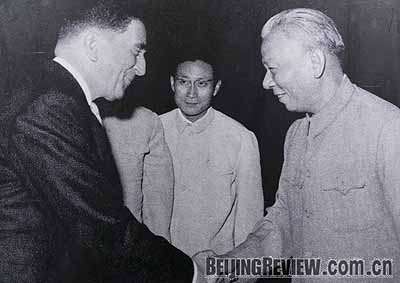|
De Gaulle then introduced the keystone of his thinking about the Chinese world: China is not a nation or a nation-state, but fundamentally is a civilization, a "very unique and very deep civilization."
Of course, France's early recognition of the PRC was a political gesture with geopolitical motives. By recognizing Mao's government, de Gaulle signaled to both Washington and Moscow that he intended to deploy an independent foreign policy. Paris was also well aware that China's goal was to become an independent international actor. On October 16, 1964, Beijing detonated its first nuclear weapon at the Lop Nur test site. One year earlier, neither France nor China signed the Partial Test Ban Treaty, which aimed to limit the arms race.
Reducing de Gaulle's decision to politics, however, misses a fundamental component of Gaullism.
When he referred to China as a civilization, de Gaulle transcended the usual geopolitical calculation and took into account a more essential reality. He wanted to see the French administration working with another foreign government, but, more fundamentally, he wanted France to be in a position to cooperate with a more permanent human construction, the Chinese civilization.
 |
|
DIPLOMATIC TIES: Lucien Paye (left), the first French Ambassador to China, presents his credentials to Chinese President Liu Shaoqi (right) on May 31, 1964 | Revealingly, de Gaulle's most remarkable link with Asia, and arguably one of his most influential sources of information on China, was not as a diplomat or businessman, but as a powerful writer who for 10 years served the French President as minister for cultural affairs. Andr Malraux-the embodiment of the engaged intellectual, a commentator, and an important actor in the major crises of the 20th century-combined an encyclopedic erudition with a traveler's experience of the world's diversity.
Malraux's intellectual representation of the Chinese world and de Gaulle's understanding of the historical and cultural dimensions mutually reinforced each other.
In 1965, de Gaulle asked Malraux to visit China as his personal envoy. In Beijing, on behalf of the French president, Malraux had conversations with Chen Yi, Zhou Enlai and Mao Zedong. Malraux published the content of his discussions in his Antimemoirs. It is an epic narrative in which strong historical forces test and forge extraordinary lives as much as powerful human wills shape history. Malraux sees Mao as the "emperor of bronze" and he announces in an oracular tone that "300 years of European energy are fading while the Chinese era begins." He also attributes to Mao these intriguing words: "I am alone...or just with few faraway friends. Please convey my regards to General de Gaulle."
Malraux not only influenced de Gaulle's perception of China, but he also had an impact on the way Nixon approached his journey to Beijing. Before his trip to China in February 1972, the American president invited the 71-year-old French writer to the White House.
De Gaulle concluded his press conference with another remark about what he called the "affinities" between France and China. Indeed, French and Chinese intellectuals, being animated by the same curiosity to understand each other, have been linked for centuries by a mutual attraction. But affinity also envelops the idea of similarity. Despite all the differences between France and China, they share a singularly high esteem for culture.
Though the world has changed considerably in the past 45 years, de Gaulle is still a source of inspiration. His vision and resolute action put the Sino-French relationship on a special trajectory. Today, this relationship has to contribute to a strong Sino-European synergy, a prerequisite to more balanced global governance. The year 2008 ended regrettably with an unnecessary quarrel between Beijing and Paris, but the tension-so contrary to the usual mutual respect and friendship between the two capitals--will not last.
If, in a world threatened by various forms of disorder, French and Chinese constructive forces are extremely helpful on their own-from the United Nations to the financial market, from laboratories to universities-their cooperative joint effort is indispensable.
French, European and Chinese leaders have to reflect again upon de Gaulle's decision to recognize the PRC. It is an invitation to consider China as a living civilization and a co-architect of the 21st century global equilibrium. In its highest expression, Gaullism is the effort to act according to permanent realities. In that sense, its relevance remains in the midst of changes and despite all the noise of superficial posturing. |
